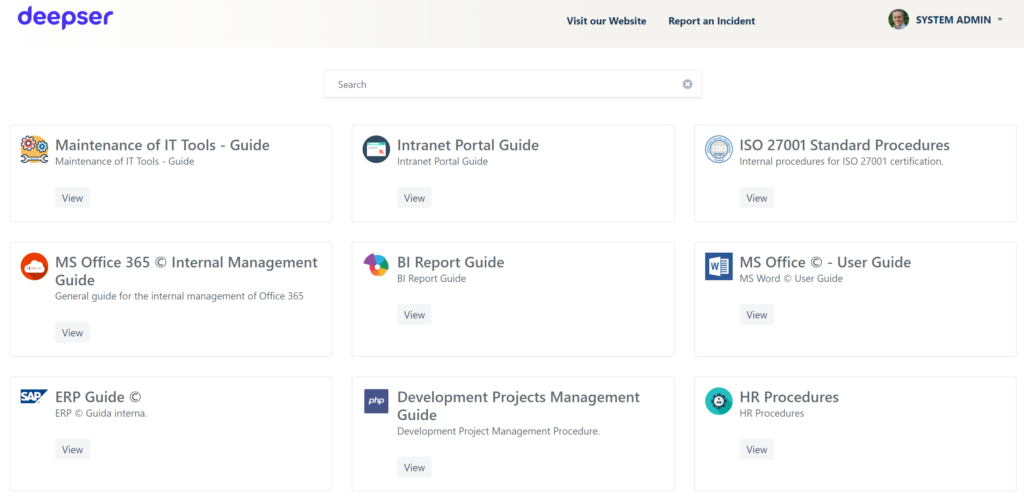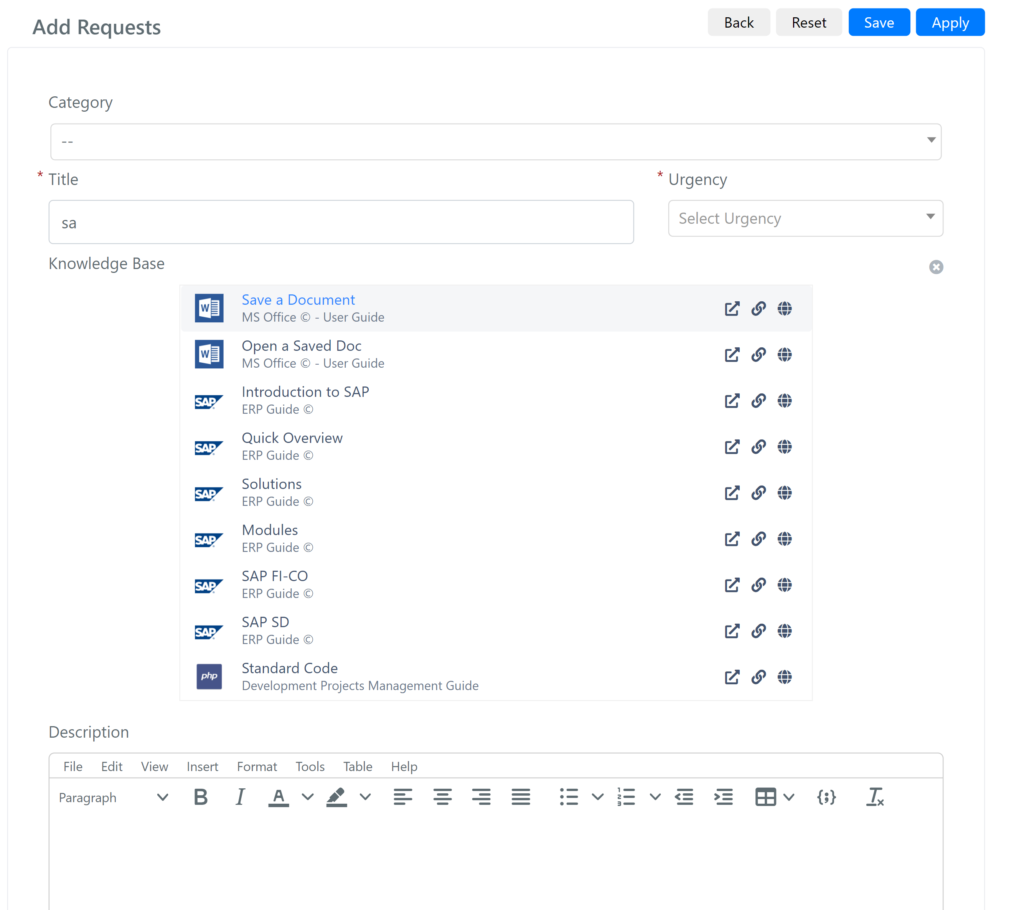Presenting the Benefits of Using a Knowledge Base Linked to Help Desk Software
Knowledge Base integrated with Help Desk Software transforms customer support by providing immediate answers and reducing repetitive requests. In this article we will uncover how this solution enhances customer autonomy and optimizes the work of support agents.
In today’s fast-paced digital world, providing excellent customer support is more important than ever. Companies need to be efficient, responsive, and informative to keep customers satisfied. One of the most effective ways to achieve this is by integrating a knowledge base with helpdesk software.
A knowledge base is a centralized repository of information that includes articles, FAQs, how-to guides, and troubleshooting tips. It’s designed to help customers find answers to their questions quickly and easily. When linked with helpdesk software, a knowledge base becomes a powerful tool for enhancing customer support, managing knowledge efficiently, and increasing customer satisfaction and engagement.
Let’s dive into the benefits of using a knowledge base linked to helpdesk software and how it can transform your customer support experience.
What is a Knowledge Base?
A knowledge base is a centralized source of information that provides solutions to common issues and questions, assisting both customers and employees. It is an integral part of a service desk, ensuring accessible and user-friendly information that enhances the overall customer experience and enables help desk agents to efficiently resolve problems.

The primary purpose of a knowledge base is to:
- Create a resource that offers easy access to accurate and relevant information for both customers and employees.
- Enhance customer satisfaction through self-service options.
- Optimize agent productivity by reducing time spent on repetitive queries.
- Facilitate effective knowledge management within the organization.
A well-structured helpdesk knowledge base is vital for any company aiming to deliver exceptional customer support and streamline internal processes.
Types of information in a Knowledge Base
Helpdesk knowledge bases typically contain a variety of information types, such as:
- FAQs
- How-to guides
- Troubleshooting tips
- Best practices
Having a helpdesk knowledge base that contains a wide range of relevant content is crucial for meeting the diverse needs and preferences of customers. This ensures that they can find the answers they are seeking efficiently.
Advantages of implementing a Helpdesk Knowledge Base
By implementing a helpdesk knowledge base, your organization can enjoy several benefits. These include higher levels of customer satisfaction, improved productivity among support agents, and more effective knowledge management.
Having a well-organized knowledge base that offers easily accessible and helpful information has a direct impact on the success of your customer support efforts. It also contributes to positive outcomes for your business.
Enhanced Customer Support efficiency
One of the main benefits of linking a knowledge base with helpdesk software is the boost in customer support efficiency. Here’s how it works:
Quick answers for customers
Customers can find answers to their questions quickly by searching the knowledge base. They don’t have to wait in line for an email response from a support agent. This immediate access to information helps customers solve their problems faster and on their own terms.
For example, if a customer is having trouble setting up a new product, they can search the knowledge base for setup guides. Within minutes, they have the information they need to get started.
Reduced time spent on common queries
When common questions and issues are documented in a knowledge base, support agents spend less time answering repetitive queries. This frees up their time to focus on more complex and unique problems that require personalized attention.

Imagine a customer support team receiving hundreds of emails about the same issue. With a well-maintained knowledge base, customers can find the solution themselves, significantly reducing the volume of support tickets.
Uniform responses and information dissemination
A centralized knowledge base ensures that all customers receive consistent and accurate information. Support agents refer to the same set of articles and guides when assisting customers, which helps maintain uniformity in responses.
This consistency builds trust with customers, as they know they can rely on the information provided. It also ensures that the entire support team is on the same page, reducing the risk of miscommunication or conflicting information.
Improved knowledge management
A knowledge base is not just for customers; it significantly enhances knowledge management within your organization.
Centralized information repository
A well-maintained knowledge base acts as a centralized repository of information. It facilitates the sharing of knowledge between agents and ensures that everyone has access to the most current and accurate information. This promotes a culture of continuous learning and improvement.
Preventing knowledge loss
By documenting solutions and best practices, a knowledge base helps prevent knowledge loss. This is especially important when employees leave or change roles. New agents can quickly get up to speed by accessing the documented knowledge.
Facilitating training and onboarding
A comprehensive knowledge base is a valuable resource for training and onboarding new agents. It provides them with the information they need to handle customer inquiries effectively and confidently.
Increased customer satisfaction and engagement
A knowledge base plays a crucial role in increasing customer satisfaction and engagement.
Empowering customers
When customers have access to a knowledge base, they can solve issues independently. This empowerment leads to higher satisfaction as they feel in control of their support experience. It also reduces their dependency on support agents for simple issues.
Gathering feedback
Customer interactions with the knowledge base provide valuable insights. By analyzing which articles are most viewed and where customers spend the most time, you can gather feedback to improve both the product and support services. This continuous improvement loop ensures that your knowledge base remains relevant and useful.
Enhanced customer experience
A well-structured and easy-to-navigate knowledge base improves the overall customer experience. Customers appreciate being able to find information quickly and easily, leading to higher levels of satisfaction and loyalty.
Conclusion
An understanding of helpdesk knowledge bases is crucial for ensuring customer satisfaction, boosting agent productivity, and facilitating effective knowledge management. A helpdesk knowledge base is a repository that contains different kinds of information to meet the needs and preferences of customers. It provides several benefits, including increased customer satisfaction, improved productivity for agents, and more effective knowledge management.
To select the appropriate knowledge base software, it is crucial to carefully assess features, pricing, and post-sales support options for optimal outcomes.
Are you ready to revolutionize your customer support and empower your team with the power of knowledge? Explore the benefits of integrating a knowledge base with your helpdesk software and see the difference it can make. Request a demo today and take the first step towards enhanced customer satisfaction and improved operational efficiency.
Visit Deepser to learn more about how our knowledge-base solutions can help you achieve your support goals.